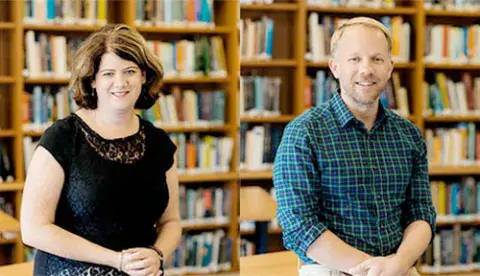
Dr. Brack Hale and Dr. Alexandra Peat, Professors of Environmental Science and Literature, respectively, have spent the past semester doing research while on sabbatical. Correlating with their fields of study and their teaching at Franklin, both professors wrote and received grants from prestigious institutions to support the research they’re conducting. The research itself has been extremely complementary to Dr. Peat’s and Dr. Hale’s prior research, as well as their courses here at Franklin.
While researching with the Caledonian Research Fund / Royal Society of Edinburgh European Visiting Research Fellowship, Dr. Peat has been focusing on Scottish Modernism in the specific context of the 1938 British Empire Exhibition in Glasgow. “My view of empire exhibitions as nexus points for circulating, colliding, and contesting views on imperial and international relations, also builds on my longstanding research and teaching interests in colonial/postcolonial studies.
“I feel that this project is also politically and culturally timely, for it works to draw attention to an important, but overlooked, aspect of Scotland’s heritage and examines Scotland’s national identity and ties to various global communities,” said Dr. Peat. Her work during the fellowship will contribute to the second chapter in a book on Modernist Exhibitions, “Exhibiting the World: Modernist Literature and the Culture of Exhibitions” and to her courses, such as this fall’s Britain in Fragments as well as her Academic Travel to Scotland.
Dr. Hale has spent the semester in the University Centre of the Westfjords Iceland, analyzing the potential social and environmental impacts caused by educational travel programs (such as study abroad, field courses, Academic Travel). Using a Geographic Information System (GIS), Dr. Hale has been comparing the environmental impacts of educational travel programs that visit the region with those from regular tourism
“This project was a logical next step to research that Dr. Vogelaar and I have been doing, specifically to look at whether programs are engaging in behaviors that could negatively impact host communities and environments,” said Dr. Hale. “In addition to scholarly articles, we also hope to publish guidelines for universities regarding best practices in educational travel to help people who plan, organize and/or lead educational travel programs to avoid unnecessary impacts of their students and programs, which will certainly be relevant to Franklin’s Academic Travel program.” The research will additionally aid in studying sustainability in Professor Hale’s own Academic Travel course, Tourism and the Environment: Iceland.
Research is a fundamental part of post-secondary education, and both professors have reflected positively on their research experiences both for their personal and professional development.
“The sabbatical for me has been a wonderful opportunity to engage in research and develop new insights and perspectives; at the end of the day, it should enhance what I have to offer students at Franklin,” said Dr. Hale.
Both Professors highlight the importance of sabbaticals as an important and normal part of university culture, allowing faculty to continue pursuing their own research interests and develop new projects and ideas. Dr. Peat concludes that, “one of the reasons that attending conferences and actively conducting research is important is because it keeps us humble, keeps us on our toes, and forces us to constantly be receptive to new ideas and approaches in our field.”
Related feature: Iceland: Excellent Destination for Academic Travels

